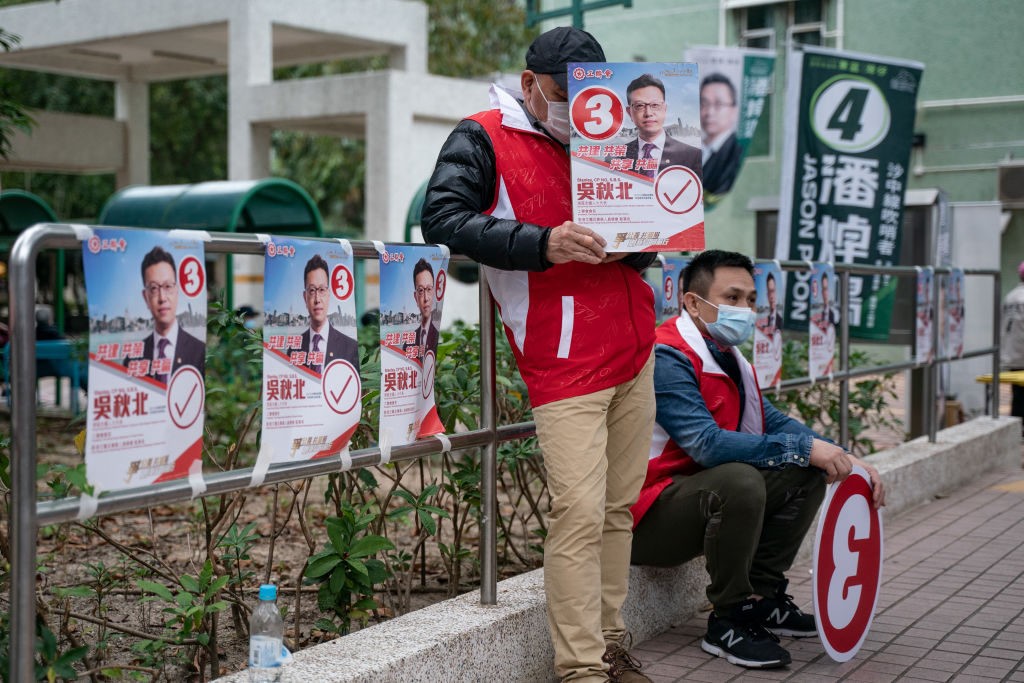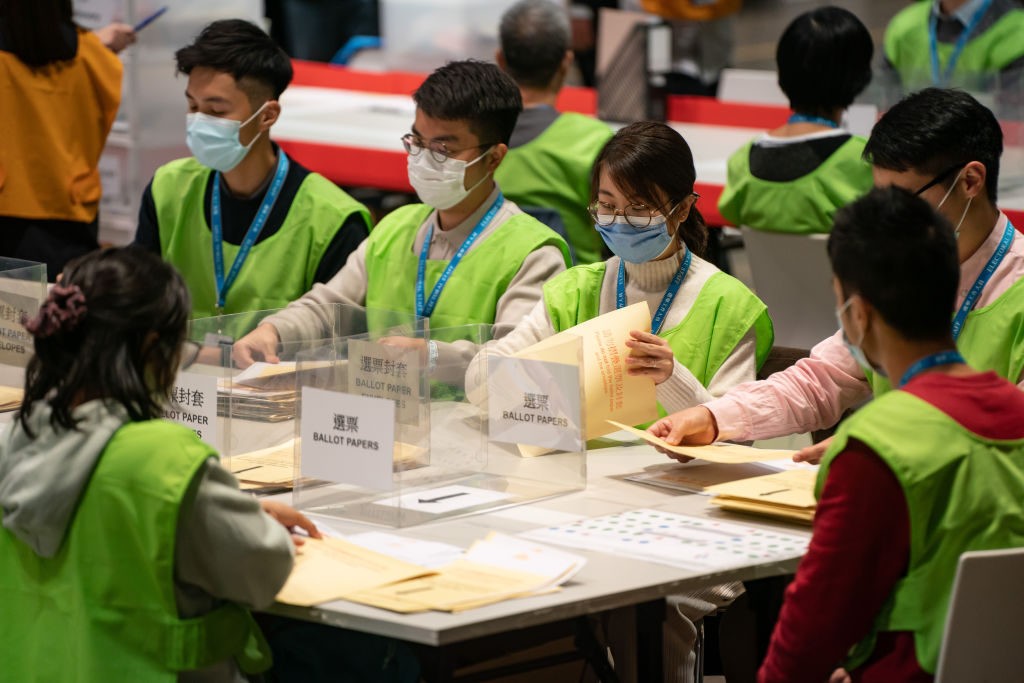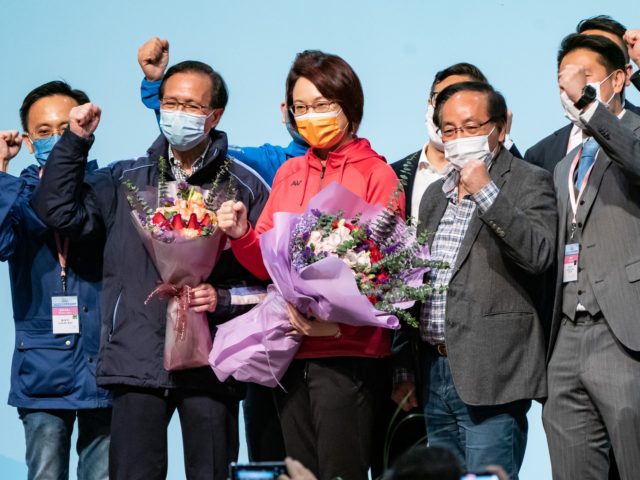Chinese state media on Sunday trumpeted the “landslide victory” of pro-Beijing “patriotic” candidates in Hong Kong, while governments across the free world expressed grave concerns about a sham election in which pro-democracy candidates were legally persecuted and prevented from running.
Hong Kongers evidently know a Communist scam when they see one, as turnout for the rigged election dropped to just 30.2 percent – the lowest participation rate since the United Kingdom gave control of the island to China in 1997. Turnout was over 70 percent for District Council elections at the height of the 2019 protest movement, producing a genuine landslide victory for pro-democracy candidates.
The previous two legislative elections boasted over 50 percent turnout.
Hong Kong’s Beijing-controlled chief executive Carrie Lam nevertheless pronounced herself “satisfied” with the results of Sunday’s election, in which only “patriotic” candidates loyal to the Chinese Communist Party were permitted to run, while many pro-democracy activists languished in prison.
“For registered voters, deciding whether they want to exercise their voting rights in a particular election is entirely a matter for themselves,” Lam sniffed. “In this election, 1.35 million voters cast their votes. They did not just return candidates of their choice to LegCo, and I think it was also because of their support for the improved electoral system.”

Starry Lee (bottom-C) speaks at a press conference with party members in Hong Kong on December 20, 2021 as Pro-Beijing candidates swept to victory in a “patriots only legislature vote that saw record low turnout from voters and government loyalists sweep every seat. (PETER PARKS/AFP via Getty)
The system was “improved” by banning all candidates who publicly criticize the government of Hong Kong, officials in Beijing, or the Chinese Communist Party, an exercise of tyranny justified under the “national security law” imposed by the Chinese government in the summer of 2020 to crush the pro-democracy movement.
“The government hasn’t set any target for the voter turnout rate, not for this election, not for previous elections, because there is a combination of factors that will affect the voter turnout rate in any election,” she insisted.
Lam argued the low turnout rate actually indicates high public trust in the government and sitting legislators, a claim dismissed by the pro-democracy League of Social Democrats as “ridiculous.”
Hong Kongers expressed their disdain for the rigged election by spending Sunday cavorting in the island’s parks. A picnic was held in West Kowloon to protest “Minions Ruling Hong Kong.”
Hong Kong’s former administrative power, the United Kingdom, issued a joint statement with the United States, Canada, Australia, and New Zealand on Monday expressing “grave concern over the erosion of democratic elements” in the island’s electoral system:
Since handover, candidates with diverse political views have contested elections in Hong Kong. Yesterday’s election has reversed this trend. The overhaul of Hong Kong’s electoral system introduced earlier this year reduced the number of directly elected seats and established a new vetting process to severely restrict the choice of candidates on the ballot paper. These changes eliminated any meaningful political opposition. Meanwhile, many of the city’s opposition politicians – most notably the majority of the “NSL 47” – remain in prison pending trial, with others in exile overseas.
We also remain gravely concerned at the wider chilling effect of the National Security Law and the growing restrictions on freedom of speech and freedom of assembly, which are being felt across civil society. NGOs, trade unions and human rights organisations not supportive of the government’s agenda have been forced to disband or leave, while media freedoms are being curtailed at pace.
The statement concluded by calling on the Chinese government to remember the promises to respect Hong Kong’s autonomy and “fundamental freedoms” when it took control of the city in 1997.
Chinese state media, on the other hand, hailed the election as “a firm step toward good-quality democracy in Hong Kong,” as the Global Times put it on Sunday.
The Global Times amusingly insisted the election featured a vibrant slate of candidates who “hold different political views” and were “highly representative” of the Hong Kong population. The candidates blocked from the race were supposedly “radicals” who are “willing to act as pawns for external forces.”
The Global Times said the orderly voting on Sunday was a welcome contrast to the 2019 elections with their massive turnout, when “violence cast a shadow over Hong Kong” and pro-Beijing politicians were “threatened, harassed, or even attacked.”
“Hong Kong and the Hong Kong people have had enough of these people trying to destabilize Hong Kong and China under the banner of ‘democracy.’ The national security law for Hong Kong passed in 2020 and the new electoral system adopted in 2021 will point the direction for Hong Kong’s democracy,” the Chinese Communist paper editorialized.

Supporters of Stanley Ng Chau Pei, president of Hong Kong Federation of Trade Unions, hold placards during a Legislative Council election campaign on December 19, 2021 in Hong Kong, China. (Anthony Kwan/Getty Images)

Officials count ballots following the Legislative Council General Election on December 19, 2021 in Hong Kong, China. (Anthony Kwan/Getty )
The Global Times dismissed Western concerns about the election as mere “propaganda” intended to create a “chaotic Hong Kong” that would suit their geopolitical interests.
“Such blatant interference in an election is the invasive behavior which the U.S. and Western countries often use to criticize other countries and regions. Now they are targeting Hong Kong with such tactics, which exposes their true intention and hypocrisy,” the editorial railed.
The Chinese central government on Monday published a farcical “white paper” certifying the robust health of democracy in Hong Kong.
The paper actually claimed democracy is better protected in Hong Kong than in the United States or United Kingdom, breezing past the pitiful turnout for Sunday’s fixed contest to claim Hong Kongers are better able to shape their own government than citizens of Western powers, and the island is now more resistant to “antagonistic forces” like America and Britain now that “unpatriotic” candidates have been weeded out.
“In the eyes of some experts, the new electoral system in Hong Kong is another vivid example that the city won’t blindly follow the Western model of democracy, but adopt the system that is in line with its historical background and current situation,” the Global Times said.

COMMENTS
Please let us know if you're having issues with commenting.